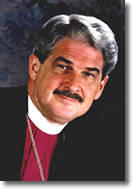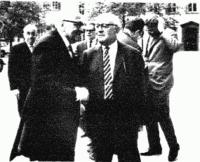Reasserting the Argument for Gay Marriage
In May I posted a biblical argument for gay marriage here; it may be time to reassert it. It isn't really ECUSA's argument--ECUSA might disavow it, ironically, as its own reasoning at Nottingham (it seems to me) worked within the rather different parameters set out in Holmes and Westerhoff's "Christian Believing." And despite my conservative premises, the right won't take it in either, I fear. My argument is an orphan, and still young; nevertheless, don't hold back. I'm truly curious about what sort of criticism it can gather. Sometimes Blake is right: opposition is true friendship.
I. The Big Picture Sketched (still working this out)
The telos served in sex is the eschatological union of humanity and God, our ultimate satisfaction, of which sex is a merest foretaste. The union of sex is an, alas, defective imitation of our union with God in the world to come. Not that our union with God must be sexual--we can only see through the glass darkly on the point of what constitutes blessedness. But blessedness eminently contains the satisfactions we aim at in sex; God willing, we will not miss the sexual praxis we leave behind, and we will recognize in our life with God what we were after here below all along.
But that foretaste is immensely important in this state; in the service of Christ it is more a help to the Church's ministry of reconciliation than Paul appreciated; set against the service of Christ, it is just as damaging and withering as Paul said. As with the unity of the divine nature, the sexual unity of which human nature is capable is productive--most dramatically in the case of conception, where the transient sexual union of parents can produce, with God's help, another person. But that unity can be productive in other ways that serve Christ. In any sexual activity, fidelity to Christ or our relationship with God is the measure by which its moral qualilty is determined--that does not imply divine command theory so much as imply, for instance, that any sexual act turning us away from God is morally wrong.
[There's clearly alot of work to do here--my apologies. Feel free to critique what's here anyhow. I assume that (a) chastity is universally obligatory; if in addition (b) sex is permitted only within marriage, and (c) marriage may be only heterosexual, it seems to follow that all homosexual activity is forbidden. This type of argument is familiar on the right, and I confess to holding (a) and (b)--thus I must do something with (c).]
II. The Argument Itself
I'll first set out the steps, and then talk briefly about each one:
1. Christ was resurrected in the flesh, and will exist in the world to come.
2. In the world to come, members of the Church will be resurrected, male and female, in the flesh.
3. In the world to come, the members of the Church will bear a new real, reciprocal relation to Christ; call it R.
4. Here below, marriage should be modeled on R.
5. R obtains between males: for instance, Christ and each blessed male.
6. As R obtains between males, and marriage is to be modeled on R, marriage may obtain between males.
(1) and (2) need resurrected bodies to have a sex (the term "gender" is heavily contested), at least male or female. If you think therfe is no resurrection, or that we will be resurrected sexless with smooth spots, my reasoning won't work for you.
(3) is tricky--you may or may not think of the Church as a ghostly entity over and above its members. Regardless of where you stand on the Church as an entity per se, all I need is for its members each to bear R to Christ, and Christ to them. R is not just metaphorical; there is a concrete, real side to it as well.
(4) is from Paul in Ephesians: R is normative for marriage here below. We are to imitate now in our married lives the relation of Christ to the Church in the world to come. This is an instance of what I mentioned in (I) above about our relationship to Christ being the measure of sexual morality here below.
(5) is trivial.
(6) doesn't rest on drawing an analogy. Rather, given that R holds between males, nothing obstructs marriage holding between males: in the kind of union marriage imitates, its paradigm, our union with Christ in the world to come, male (Christ) is united to male (believer). Marriage here below that does not permit male to be joined to male falls short of what it should be in yet another way. That is, "falling short" is inevitable in imitation, but to willfully fall further short than necessary is perverse.
Note that (1) to (5) are all traditional and biblically based premises; you don't need to bring in much outside contemporary philosophy to get them from the text. Indeed, in other contexts, I believe many on the Anglican right would assent to each of (1) to (5) individually with a yawn and move on to something more controversial. But that is the strength of the argument--it provides a more productive ground on which to argue, since it is ground both sides can share.
Please note also, R is not marriage--I presume there is no marriage in heaven. R is not marriage, but that after which marriage is to be modeled.
Fire away, in a constructive way, of course.
Long Addendum: Under what conditions would I concede this argument is sunk? If there is some feature F of R that precludes homosexual marriage, but permits the union of a male to Christ in the world to come. Being a bit of a cognitive voluntarist, and having already commited myself to a side in the debate, I don't trust my intuitions about R--maybe there is such a feature F despite my convictions to the contrary.
Why wouldn't citing Genesis, Leviticus or Romans do the trick? I'm going to interpret those passages and others like them to be consistent with what I want to say about R; interpretation of such passages can be controlled by the ideas of texts prior in importance for the sake of the argument, e.g. Ephesians.
Well then, you might ask, whence F? Say something about the Christian meaning of marriage, tell a biblical story, such that while it does not beg the question (at least, not in any obvious way), it implies for some reason homosexual marriage is to be ruled out.






